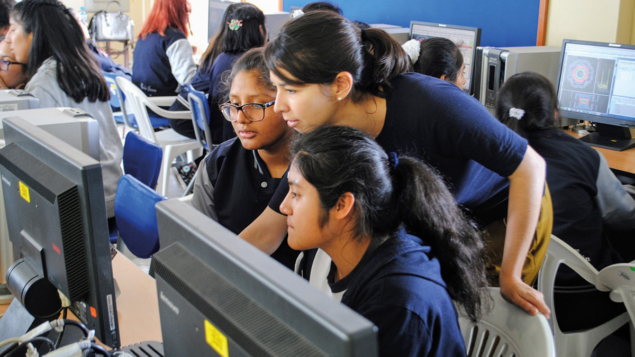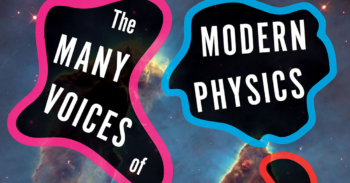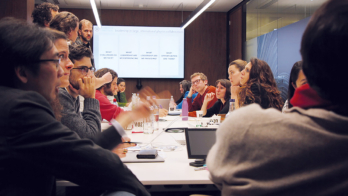CERN alumni describe teaching as one of the toughest but most rewarding things they have done, and how a research background in particle physics brings significant benefits, finds Matthew Chalmers.

Particle physicists are no strangers to outreach, be it giving public talks, writing popular books or taking part in science shows. But how many are brave enough to enter a career in teaching, arguably the most important science-communication activity of all? CERN alumni who have returned to the classroom reveal teaching to be one of the hardest but most rewarding things they have ever done.
“I love my job,” exclaims Octavio Dominguez, who completed his PhD in 2013 studying the appearance of electron-cloud build-up in the LHC before deciding to switch to teaching. Having personally benefitted from some excellent teachers who sparked an “unquenchable curiosity”, he says, the idea of being a teacher had been on his mind ever since he was at secondary school. “The profession is definitely not exempt of challenges. Well, in fact I can say it’s the most difficult thing I’ve ever done… But if I keep doing it, it’s because the feedback from students is absolutely priceless. It’s truly amazing seeing my students evolve into the best version of themselves.”
Job satisfaction
Despite giving as many as 25 lessons per week, including presentations and practicals, and spending long hours outside school preparing materials and marking assignments, happiness and personal satisfaction are cited as the main rewards of working as a teacher. “I particularly enjoy seeing the enthusiasm in students’ eyes – it is something that cannot be explained with words,” says Eleni Ntomari, who was a summer student at CERN in 2006, then a PhD student and postdoc working on the CMS experiment. “From the outside, teaching might not appear difficult, but in reality it is not just a profession but a ‘project’ with no timetable and a continuation of trying to learn new things in order to become more efficient and helpful for your students.” Ntomari took advantage of every teaching opportunity that academic life offered, from being a lab instructor, becoming a CERN guide and giving talks at local schools when a teaching opportunity in Greece arose during her postdoctoral fellowship at DESY. “I realised teaching was highly gratifying, so I decided to continue my career as a physics teacher in secondary and high schools.”
I particularly enjoy seeing the enthusiasm in students’ eyes
Teachers of STEM subjects are in acute demand. In the US, physics has the most severe teacher shortage followed by mathematics and chemistry, with large surpluses of biology and earth-science teachers, according to the Cornell physics teacher education coalition. Furthermore, around two thirds of US high-school physics teachers do not have a degree in physics or physics education. The picture is similar in Europe, with a brief teacher survey carried out by the European Physical Society in 2020 revealing the overwhelming opinion that a serious problem exists: 81% of respondents believed there is a shortage of specialist teachers in their country, of which 87% thought that physics is being taught by non-specialists.
Initiatives such as the UN International Day of Education on 24 January help to bring visibility and recognition to the profession, says Dominguez: “Education is one of the principal means to change the world for the better, but I feel that the teaching profession is frequently disregarded by many people in our society,” he says. “I’ve spent most of my career as a teacher in schools in deprived areas of the UK, and now I’m doing my second year in one of the most affluent schools in the country. This has given me a new perspective on society and has helped me understand better why some behaviour patterns appear.”
The CERN effect
The fascinating machines and thought-provoking concepts underpinning particle physics make a research background at CERN a major bonus in the classroom, explains Alexandra Galloni, a CERN summer student in 1995 who completed her PhD at the DELPHI experiment in 1998, spent a decade in IT consultancy, and is now head of science and technology at one of the UK’s top-performing secondary schools. “I milked my PhD as much as I could – I promised a visit from Brian Cox to my first school at interview, and although I didn’t pull that one off, contacts at CERN have enriched life both at school and on many of the CERN trips I inevitably ended up running. The Liverpool LHCb team have hosted incredible ‘Particle Schools’ at CERN for students and staff from many schools almost every year since then, leading to gushing feedback from all involved.”
I love the variety, the unexpected moments and the human interaction in the classroom
Keeping in touch with events at CERN has also led to exciting moments for the students, she adds, such as watching the Higgs-discovery announcement in 2012, applying for Beamline for Schools in 2014, taking part in the ATLAS Open Data project and participating in Zoom calls with CERN contacts about future colliders and antimatter. “The surrounding tasks to teaching can be gruelling, and I would be lying if I said I didn’t resent the never-ending to-do list and lack of being able to plan much personal time during term-time. But I love the variety, the unexpected moments and the human interaction in the classroom.”
CERN offers many professional-development programmes for teachers to keep up-to-date with developments in particle physics and related areas, as well as dedicated experiment sessions at “S’Cool LAB”, the coordination of the highly popular Beamline for Schools competition and internships for high-school students. These efforts are also underpinned by an education-research programme that has seen five PhD theses produced during the past five years as well as 67 published articles since the programme began in 2009. “We are reaching out to all our member states and beyond to enthuse the next generations of STEM professionals and contribute to their science education,” says Sascha Schmeling, who leads the CERN teacher and student programmes. “Engaging the public with fundamental research is a vital part of CERN’s mission.”





